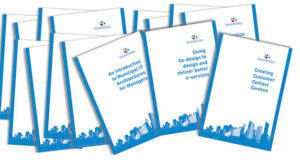SCAN – A people based innovation network
One of the key things that made the Smart Cities project different from many other ‘smart city’ networks was the key role of the Smart Cities Academic Network – a people based innovation network.

The Smart Cities academic network was made up of university and university colleges from six countries from across the North Sea region. The academic network gave government partners access to a wide range of expertise and competencies that they used as they explored new ways to improve electronic service delivery.
The academic partners helped the government partners to identify and define the key strategic questions and business challenges they faced. The academic network evaluated the impact of local and transnational work in the project, and disseminated findings and lessons learned to cities across the North Sea region, and to both academic and practitioner communities through briefings, tools, and tested methodologies.
Key outcomes from the Smart Cities Academic Network
- Dissemination of lessons and findings from the Smart Cities project to policy-makers and e-government practitioners across Europe
- Practical research reports to help cities become smarter
- Evaluation of the project’s development and impact
- Comparative analysis of the development of e-government across the North Sea Region
- Development of an e-government readiness self-assessment tool for cities
- Support for the adoption of co-design across the project
- Improvements in service delivery in all participating municipalities
Key lessons from the Smart Cities Academic Network
- Academics are not consultants. But some consultants are academics. Remember this.
- If you need consultancy, budget for it, and tender for it.
- Remember how maturity models work – maturity has a significant influence on how much partners might learn from academics.
- The only way to get better at co-design is to do it.
- Good, focused outputs are still relevant well after a project has finished.
What did I do?
I managed the research programme, including a substantial budget to buy academic time to support local partners, and developed both the knowledge management framework and the monitoring and evaluation framework for Smart Cities. I oversaw the programme’s publication and content strategy, producing a range of publications and outputs that I disseminated to a range of networks across Europe.
To see more outputs from the Smart Cities Academic network, follow this link to Smart Cities resources.